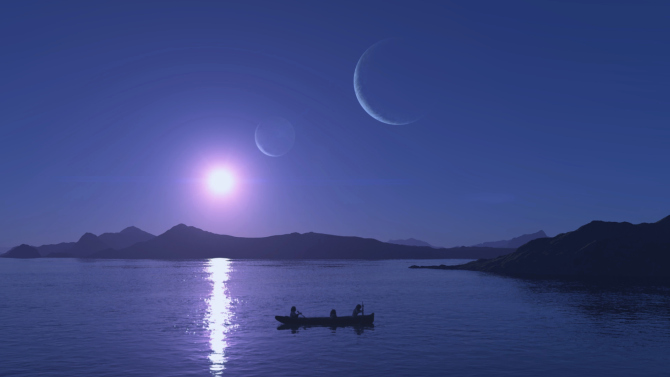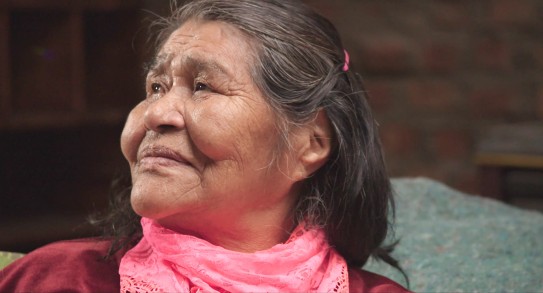Pearl Button: An interview with director Patricio Guzmán

As Patricio Guzmán continues to bring his native Chile alive on the big screen with his latest documentary, The Pearl Button, we meet up with him at the Berlin Film Festival to hear about his inspiration for the project, Chilean self-delusion and the what future his films hold in his homeland.
The Pearl Button presents the past of Chile’s indigenous people and the horrors of the Pinochet regime. We hear from a woman in the film who says there is no word in her language for “god” – that’s quite striking.
Yes, she is a woman called Gabriela Paterito, she is a member of the indigenous Kaweskar people of southern Patagonia and lives in a little village there. She is the only representative of this indigenous group who is still able to talk about the past and who still has a global understanding of the history of her people. There are four more representatives of this group of indigenous people that still exist but they don’t have that global vision or historical memory, so she’s a sort of natural leader. She still actually goes out with the canoe rowing.
You have a focus on elements in your films. In Nostalgia For Light you used the desert powerfully and here you use water.
Yes, in a way the guiding principle of this film is water: it’s a recurring element. I thought about water because I read the works of a German scientist called Theodor Schwenk, who wrote a book – Sensitive Chaos. In it he maintains that when a body of water is very still and then there’s a very slight movement on the surface, it’s the heavenly bodies, the planets and the stars that create this movement in the water. We of course have water in our bodies also, so, in a way, water is at the interface between ourselves and the cosmos, it’s a kind of mediator. That was really the first idea that I had when making this film. Of course it’s true that there are great similarities between this film and nostalgia for light and I might even turn into a trilogy, I don’t know yet.
Why did you use such poetic language to present the crimes against Chile’s people?
In order to talk about profound tragedies, genocide that takes place, looking at Palestine or Syria, talking about Chile or Argentina indeed for that matter, it’s very important to use metaphor because metaphor is very expressive, very evocative. We’ve seen images of mass graves, we’ve seen images of the Nazi concentration camps and that has been with us for quite a while already. Nowadays we still need to talk abut these events, but it is perhaps best explained in an indirect way using the language of poetry. I think it is indispensable, in a way, to seek out that language when talking about these phenomena because it is also important to speak about pain and this is a very effective way to do it.
The place of documentaries in cinema has changed, we see them being screened at big competitions and sitting alongside feature films. Has your way of working changed since the 1970s when you made The Battle of Chile?
It’s very true that in the 70s there was a tradition that dominated, the so called “direct cinema”, and that was the dominant genre of the time, but I think that nowadays independent film makers work with narrative elements as well. We use description, action, music, and we use these elements to develop characters in the film as well. So there are certainly elements that are very similar to fictional cinema, but we employ them simply with the objective of creating a documentary. To put it in a nutshell, Gabriela Paterito can never be Juliette Binoche, she can never be on the same level, they are two separate realities and they cannot be confounded. We work with reality and of course each one of us as documentary film makers develops their own style, and for me I like to work with metaphors. What is really similar to fictional cinema, though, is that we work with stories and we find a means of relating these stories.
How do the memories of these deaths and murders of the Pinochet regime manifest in Chilean society now?
They don’t exist. In Chile you don’t talk about the past, there is no debate about the past. The armed forces have never faced up to their responsibilities. There is a sort of pact of silence. For example, the episode in which bodies were thrown into the sea, which is dealt with in the film, hundreds of civilians participated, though none of them were ever brought to trial. One of the major newspapers that supported Pinochet and ferociously attacked Allende, El Mercurio, rejected afterwards that there had been any torture or that any people had disappeared during the dictatorship. They have never been tried for the false claims that they propagated and remain a popular news outlet. So there is a transition that has not been fully realised, Chile is not a democratic country. There is no real freedom of the press, there is no right to industrial strikes, the level of unionisation in Chile is very, very low and yet at the same time you have multinational companies installed in the country that hardly pay any tax. In a way Chile is a myth. It’s certainly a country that has a high level of civilisation, you can’t compare it to countries such as Bolivia or Peru, and Santiago de Chile seems like any city in the USA, but there is a deep social imbalance that marks the country. If you look at education and health, it is a shambles. I think its very important to talk about these things and to talk about the past so that we can overcome the legacy of the dictatorship. I believe that my films should be shown at schools, yet everybody’s reaction when the proposal is made is “Oh Guzmán, he’s a left winger, we don’t want him to indoctrinate our youth, we’d better keep him out”. That’s how you stifle a debate that should really take place in the country.
So when will Chile be able to come to terms with its past?
I really believe that the tragedy of the coup d’ctat will take one hundred years to overcome. I think that there are gradual steps that will take place in society and memories will resurface. Each year small steps are made and I believe that at some point the truth will be established. It might be in the next generation that this happens. My film for example, The Battle of Chile, will become a great success in Chile when I die, even 20 years after that. It’s not me who has to disappear for that to happen, the entire generation of those who were responsible for the coup d’état and who have never lived up to their responsibilities will have to disappear as well in order for these films to be seen. It is true that those people who are still around today do not face up to their responsibility. Time may be a slow actor, but it continues.
They say that history is written by the winners, but you have always looked to focus on those that have been marginalised.
That is very true and it’s something that effects the entire continent. We have rather mediocre historians and very sketchy science in terms of analysis. The historians that we have are highly ideologised and there is also the fact that in all of Latin America we have these monuments to generals who raise their swords, ready to rush into battle. And it’s no different in Chile; it’s the dominant class that has written history. Now though, there is a new generation of historians who are eager to set the score straight and praise history in a new way. Gabriel appears in the film and they’re eager to get to the bottom of what really happened and to get the film out into the public sphere in Chile – for example, we’ve had 15 massacres that have taken place since the republic was founded 200 years ago, yet they have never been mentioned. So Chile is a country that is only now beginning to venture a new gaze at its own history.
Benedict McKenna
Read more of our reviews and interviews from the festival here.
For further information about Berlin Film Festival 2015 visit here.






















Facebook
Twitter
Instagram
YouTube
RSS